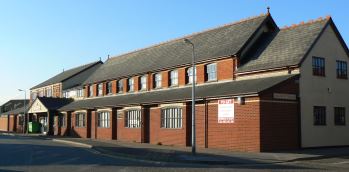Booth and Brookes Foundry, Burnham on Crouch
Booth and Brookes foundry was started in
1899 by James Wilson Booth surviving until 1981 when the foundry business
was no longer viable.
The site of the old foundry in
Foundry Lane, Burnham on Crouch is now a builders yard, shops and
Fiveways Supermarket.
The story of the foundry has
been fully documented in a splendid little book called The
foundry at Burnham by John Booth, who is a descendant of the
founder.
The foundry was sited at a
location which could profit from imports of pig iron and coke by
barges to the nearby Quay and easy access to the Crouch Valley
Railway Line which ran alongside the foundry.

P
art of the old foundry remains as it was converted into shops and officesAfter a few years the foundry
found a niche market and specialised in making Piano frames which
requires specialised casting.
The initial power source of a
steam engine was then replaced by a gas engine which included enough
spare power to produce some lights into the previously unlit
factory.
By 1912 two trains per days
plus occasional specials were required to service the foundry bring
raw materials in and taking the castings away to customers.
During World War 1 the works
continued to produce piano frames but also made casings for hand
grenades and practice shells.
After the war the factory
found a new product - Turntables for a new invention -
gramophones.
1920 saw a new power source in
that a large oil engine was fitted which powered the machines and
provided electric lighting for the factory.
Work continued successfully until World War 2 when the foundry was under the control of the board of Trade and only a few piano frames were authorised.
The main work was the production of the domes to house top secret asdic devices to locate submarines.
Other items including
secondary fuel tanks for aircraft and armaments were made in the
factory.
After the war production of piano frames
and other specialised casting recommenced with gradually increasing
problems caused by modern production methods until in 1981 a
receiver was appointed who closed the foundry at Burnham

